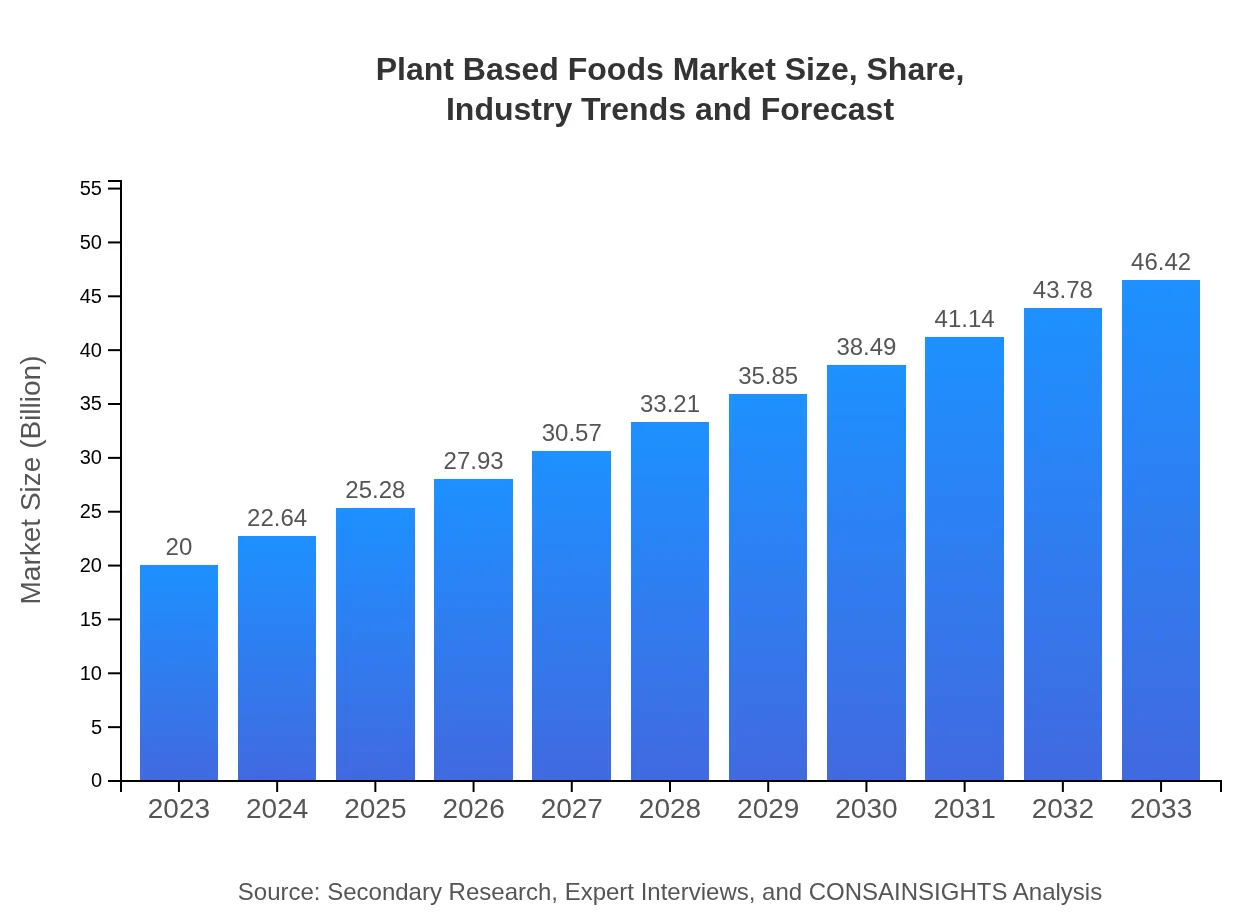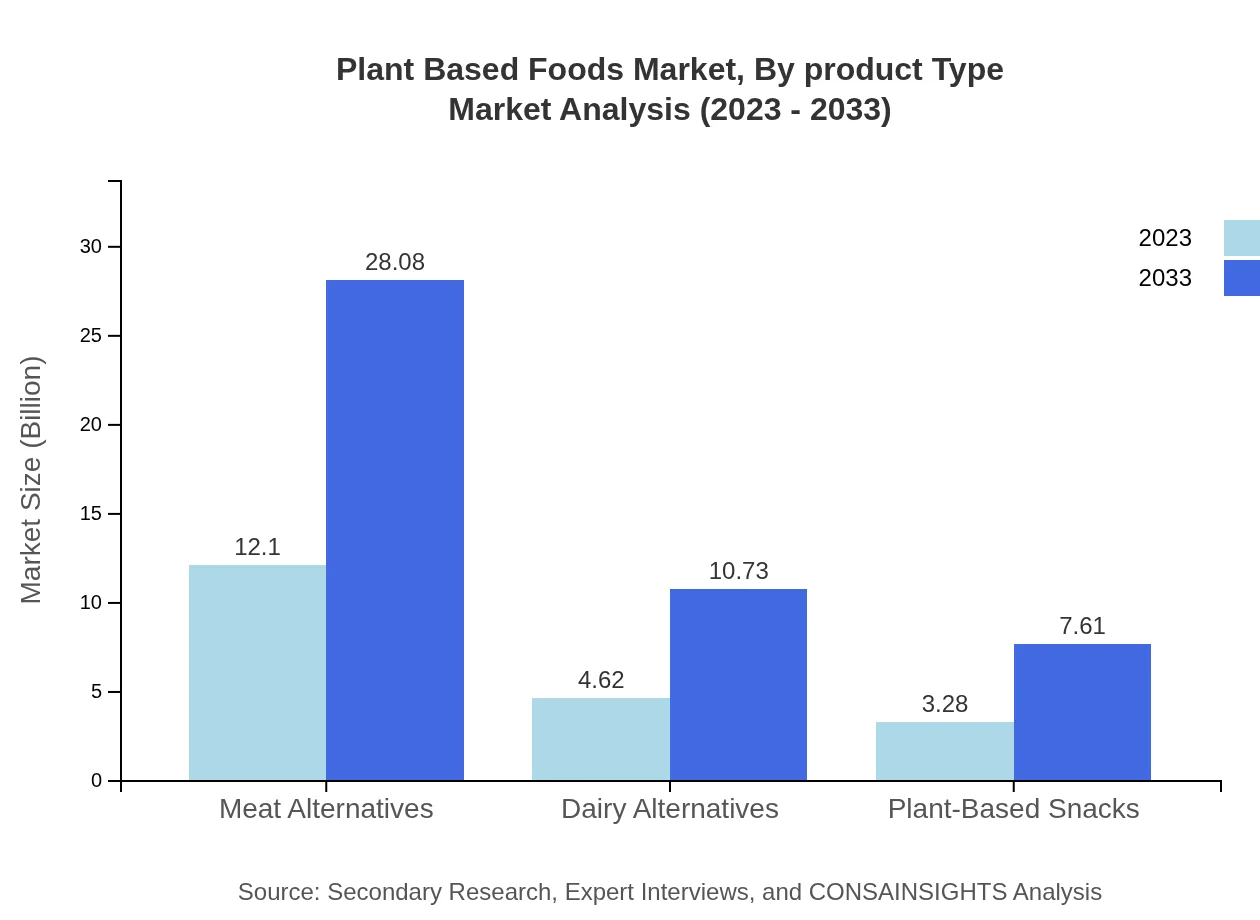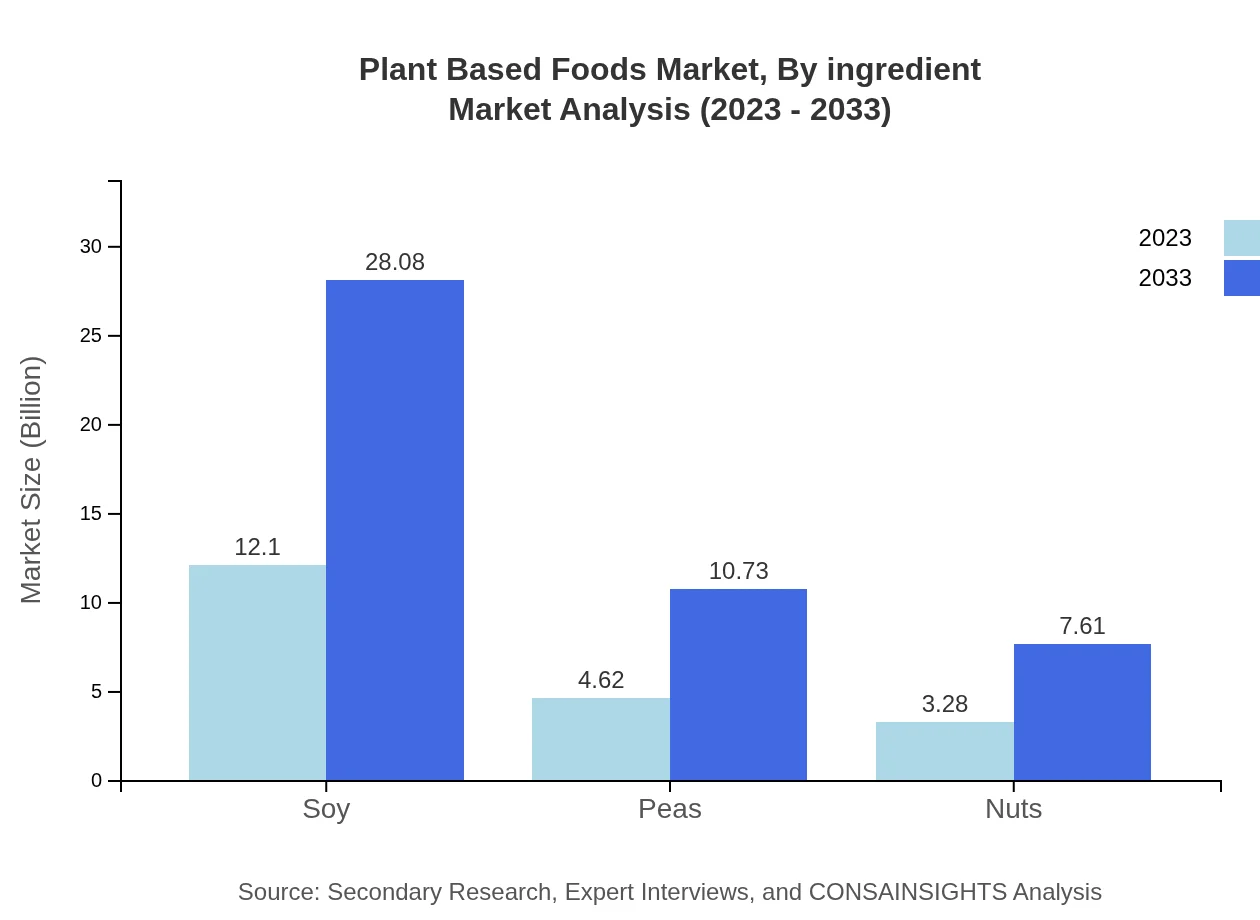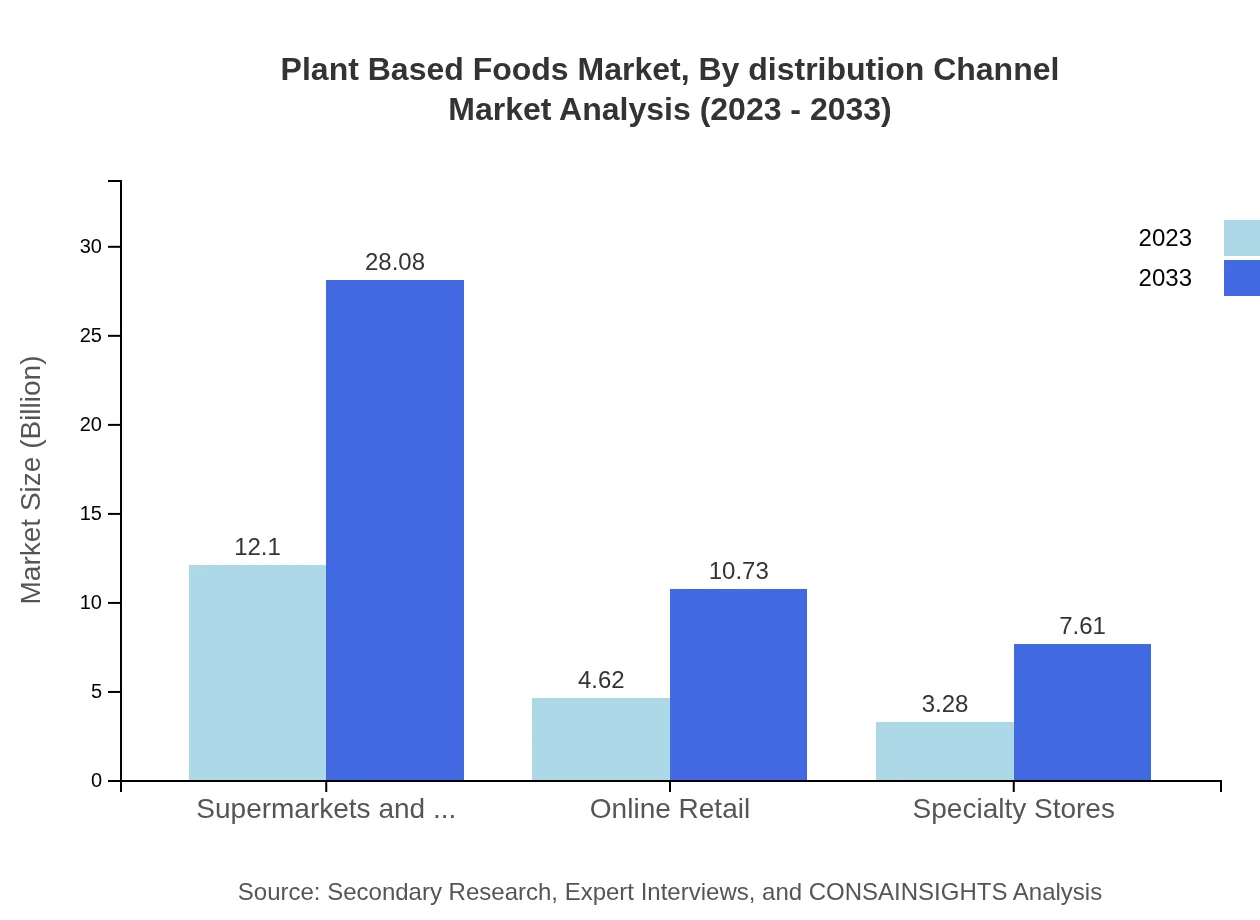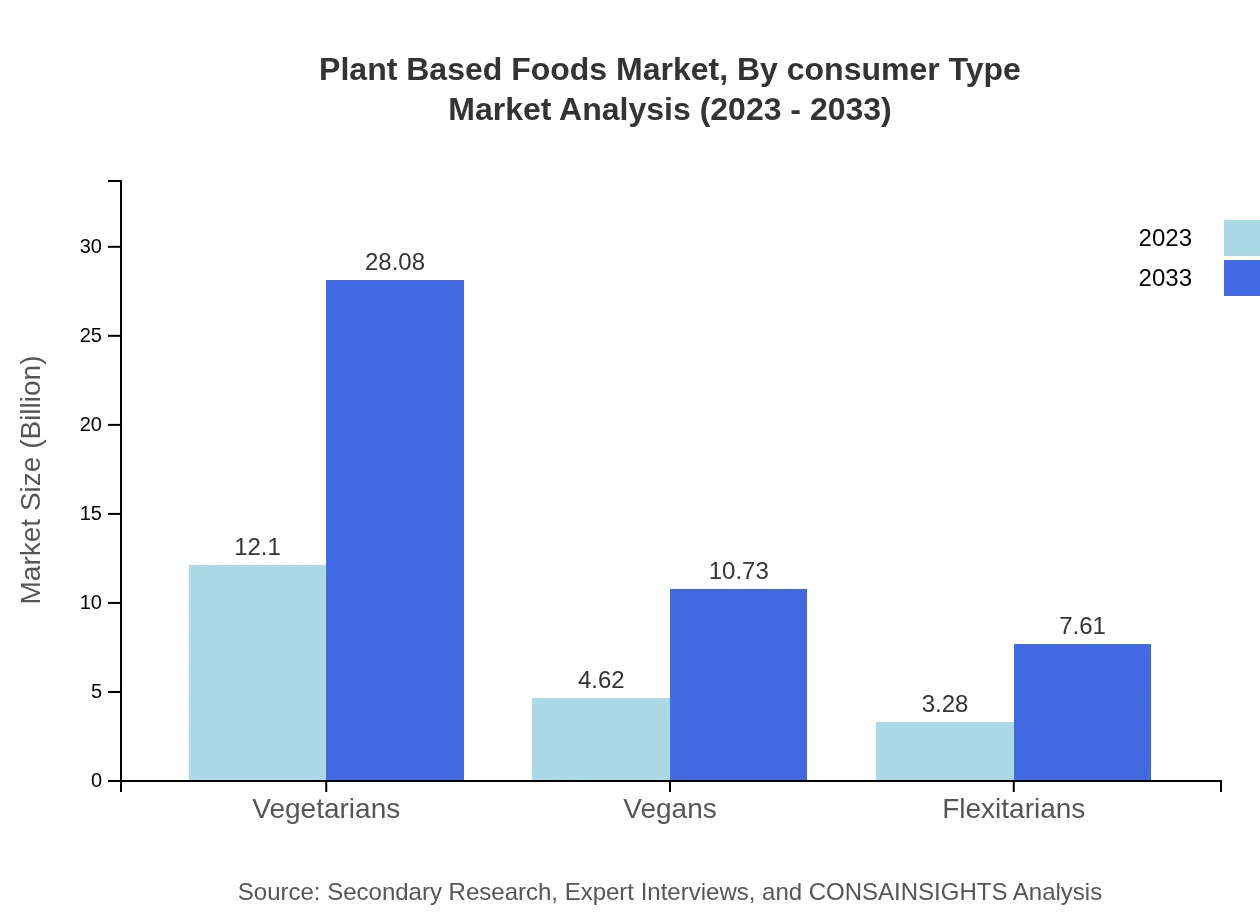Plant Based Foods
Published Date: 31 January 2026 | Report Code: plant-based-foods
Plant Based Foods Market Size, Share, Industry Trends and Forecast to 2033
This report provides comprehensive insights into the Plant Based Foods market from 2023 to 2033, examining market trends, segmentation, regional analysis, and forecasts. It delivers vital data to help stakeholders make informed decisions regarding investments and strategy development in this rapidly evolving sector.
| Metric | Value |
|---|---|
| Study Period | 2023 - 2033 |
| 2023 Market Size | $20.00 Billion |
| CAGR (2023-2033) | 8.5% |
| 2033 Market Size | $46.42 Billion |
| Top Companies | Beyond Meat, Impossible Foods, Oatly, Danone |
| Last Modified Date | 31 January 2026 |
Plant Based Foods Market Overview
Customize Plant Based Foods market research report
- ✔ Get in-depth analysis of Plant Based Foods market size, growth, and forecasts.
- ✔ Understand Plant Based Foods's regional dynamics and industry-specific trends.
- ✔ Identify potential applications, end-user demand, and growth segments in Plant Based Foods
What is the Market Size & CAGR of Plant Based Foods market in 2023?
Plant Based Foods Industry Analysis
Plant Based Foods Market Segmentation and Scope
Tell us your focus area and get a customized research report.
Plant Based Foods Market Analysis Report by Region
Europe Plant Based Foods:
Europe's market value is poised to increase from $4.82 billion in 2023 to $11.19 billion in 2033. This growth is primarily driven by stringent regulatory measures regarding health and sustainability, as well as a cultural shift towards plant-based diets, notably in countries such as Germany and the UK.Asia Pacific Plant Based Foods:
The Asia Pacific region is experiencing a notable rise in plant-based diets, with an estimated market value growing from $4.06 billion in 2023 to $9.41 billion in 2033. Countries like China and India are witnessing increased adoption fueled by urbanization and health concerns, positioning the region as a significant growth driver for plant-based innovations.North America Plant Based Foods:
North America holds a prominent position in the plant-based foods market, with an expected growth from $7.80 billion in 2023 to $18.10 billion by 2033. This region leads in innovation and product variety, with a strong presence of both established and emerging companies contributing to substantial market expansion.South America Plant Based Foods:
In South America, the market value is anticipated to grow from $0.55 billion in 2023 to $1.29 billion in 2033. Brazil leads this segmentation with burgeoning demand for plant-based proteins driven by environmental awareness and a growing health-conscious demographic.Middle East & Africa Plant Based Foods:
The Middle East and Africa region is projected to see growth from $2.77 billion in 2023 to $6.43 billion in 2033. Rising awareness about plant-based nutrition and increased availability of products in local markets are critical factors contributing to market development.Tell us your focus area and get a customized research report.
Plant Based Foods Market Analysis By Product Type
The Plant-Based Foods market is predominantly dominated by meat alternatives, with a market size of $12.10 billion in 2023, expected to reach $28.08 billion by 2033, maintaining a share of 60.49%. Dairy alternatives are also notable, anticipated to increase from $4.62 billion to $10.73 billion. Overall, product diversity plays a crucial role in catering to varying consumer tastes and preferences.
Plant Based Foods Market Analysis By Ingredient
Soy is the leading ingredient segment, anticipated to maintain its share of 60.49% with market size expanding from $12.10 billion to $28.08 billion over the forecast period. Peas follow with a market size projected from $4.62 billion in 2023 to $10.73 billion in 2033, indicating a growing acceptance of legume-based proteins among consumers.
Plant Based Foods Market Analysis By Distribution Channel
Supermarkets and hypermarkets dominate distribution channels, accounting for $12.10 billion in market size in 2023, slated to expand to $28.08 billion. Online retail is also gaining traction, predicted to grow from $4.62 billion to $10.73 billion, driven by the rising e-commerce trend that allows convenient access to plant-based foods.
Plant Based Foods Market Analysis By Consumer Type
The consumer types are categorized into vegetarians, vegans, and flexitarians, with vegetarians leading the market at approximately $12.10 billion and an expected growth to $28.08 billion by 2033. Flexitarians are also increasingly prominent, demonstrating changing consumer preferences towards more plant-centric diets.
Plant Based Foods Market Trends and Future Forecast
Tell us your focus area and get a customized research report.
Global Market Leaders and Top Companies in Plant Based Foods Industry
Beyond Meat:
Beyond Meat is a pioneer in plant-based proteins offering innovative meat alternatives that cater to both vegans and omnivores. The company emphasizes sustainability and health in its product offerings.Impossible Foods:
Impossible Foods specializes in meat alternatives obtained from plants, focusing on replicating the flavor and texture of beef, leveraging their proprietary technology to create plant-based burgers.Oatly:
Leading the dairy alternatives sector, Oatly provides oat-based products that cater to lactose intolerant consumers and promote sustainability through grain-based dairy substitutes.Danone:
Danone is reshaping its portfolio towards plant-based foods, offering various dairy alternatives under its brands like Alpro, targeting health-conscious consumers and the growing demand for sustainable food options.We're grateful to work with incredible clients.









FAQs
What is the market size of plant Based foods?
The global plant-based foods market is projected to reach $20 billion by 2033, growing at a CAGR of 8.5%. This increase reflects the rising consumer preference for healthier and sustainable food options.
What are the key market players or companies in the plant Based foods industry?
Key players in the plant-based foods industry include well-known brands and manufacturers focused on innovating plant-based products, addressing the growing demand for sustainable and healthy eating options while competing effectively in market segments.
What are the primary factors driving the growth in the plant Based foods industry?
Growth in the plant-based foods industry is driven by increasing health consciousness, environmental sustainability awareness, dietary preference changes, technological advances in food production, and expansion of product availability and variety.
Which region is the fastest Growing in the plant Based foods market?
The fastest-growing region in the plant-based foods market is North America, projected to grow from $7.80 billion in 2023 to $18.10 billion by 2033, reflecting significant consumer interest in plant-based options.
Does ConsaInsights provide customized market report data for the plant Based foods industry?
Yes, ConsaInsights offers customized market report data tailored to specific needs in the plant-based foods industry, allowing for focused analysis of trends, market dynamics, and consumer preferences.
What deliverables can I expect from this plant Based foods market research project?
Deliverables from the plant-based foods market research project typically include detailed reports, analysis of market trends, competitive landscape evaluation, and forecast data segmented by region and product type.
What are the market trends of plant Based foods?
Current market trends in plant-based foods include growing popularity among flexitarians, the rise of online retail channels, increased product innovation in dairy and meat alternatives, and expanding distribution in supermarkets and specialty stores.

